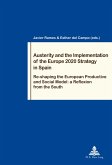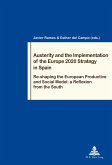This book - based on a research project carried out by the Observatoire Social Européen asbl, with the financial support of the European Trade Union Institute (ETUI) - looks at the most recent developments in pension policy and politics in Europe and advances our understanding of the field in three respects: firstly, it contributes to improve our knowledge of the most recent reform wave passed in the wake of the recent economic and financial crisis; secondly, it assesses the long-term financial and social sustainability of pensions; thirdly, it analyses the politics of pensions and the way policymakers and stakeholders interact in order to address the major challenges to pensions.
The evidence proposed by six country chapters (about Italy, France, Finland, Poland, the Netherlands and UK) and three more transversal chapters (about the role of the EU, that of trade unions in pension reforms, and the main challenges to pension systems in Europe) proves that pension systems have been altered in the wake of the recent crisis. The more evident changes have consisted of: the halt - at least in some countries - of the spread of private pension funds; the improvement in the financial viability of the systems paralleled by more evident risks for the future adequacy of pension benefits; and the alteration of pension politics with the risk of the progressive marginalisation of the trade union movement. In many countries, reforms have been passed without any major social concertation, while the European Union (EU) has had a more evident influence, especially in the countries hit most by the crisis. As a consequence of these trends, we see the emergence of a "new" pension mix in Europe, with new institutional settings, and new challenges.
Hinweis: Dieser Artikel kann nur an eine deutsche Lieferadresse ausgeliefert werden.
The evidence proposed by six country chapters (about Italy, France, Finland, Poland, the Netherlands and UK) and three more transversal chapters (about the role of the EU, that of trade unions in pension reforms, and the main challenges to pension systems in Europe) proves that pension systems have been altered in the wake of the recent crisis. The more evident changes have consisted of: the halt - at least in some countries - of the spread of private pension funds; the improvement in the financial viability of the systems paralleled by more evident risks for the future adequacy of pension benefits; and the alteration of pension politics with the risk of the progressive marginalisation of the trade union movement. In many countries, reforms have been passed without any major social concertation, while the European Union (EU) has had a more evident influence, especially in the countries hit most by the crisis. As a consequence of these trends, we see the emergence of a "new" pension mix in Europe, with new institutional settings, and new challenges.
Dieser Download kann aus rechtlichen Gründen nur mit Rechnungsadresse in A, D ausgeliefert werden.
Hinweis: Dieser Artikel kann nur an eine deutsche Lieferadresse ausgeliefert werden.









